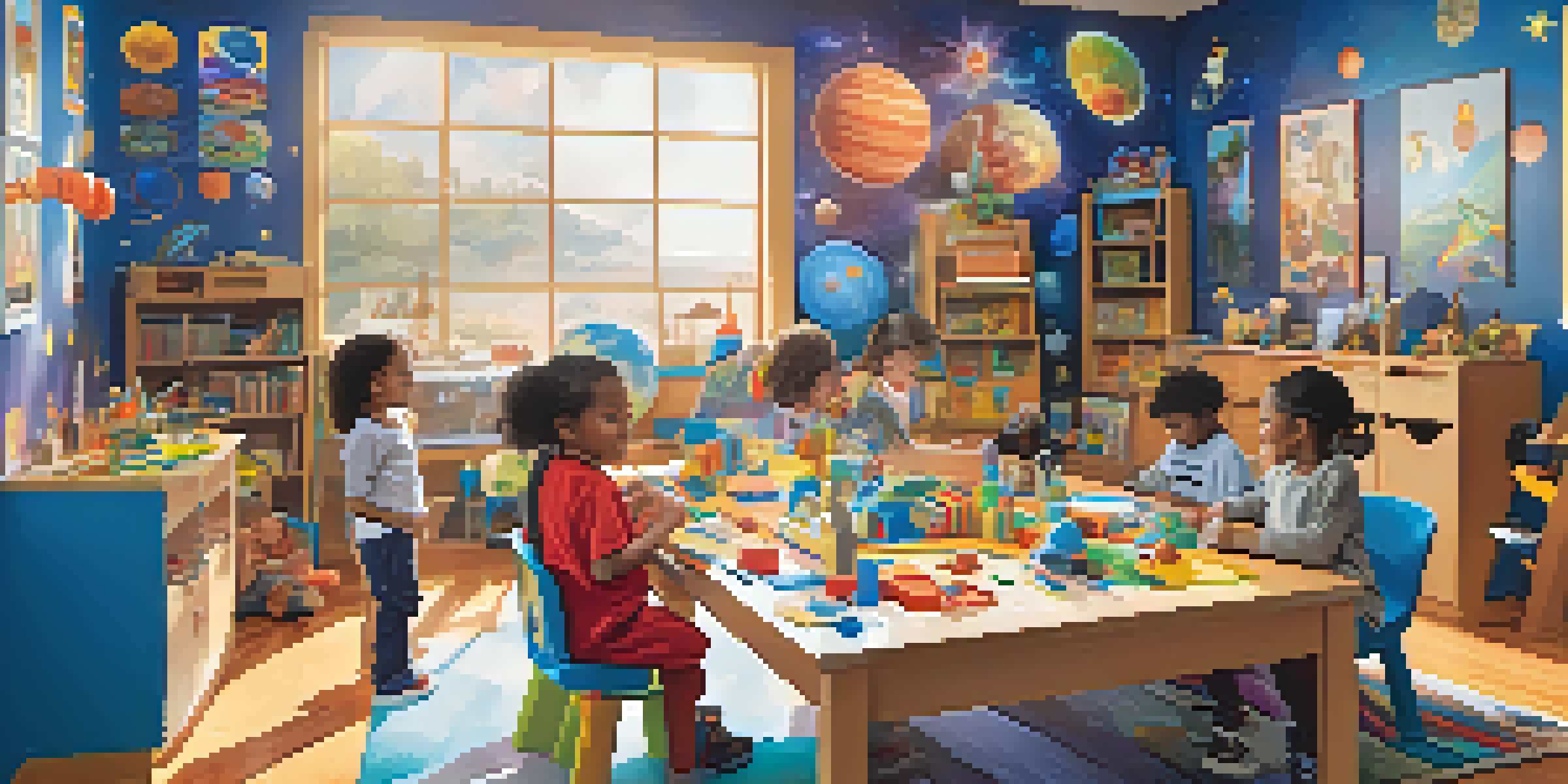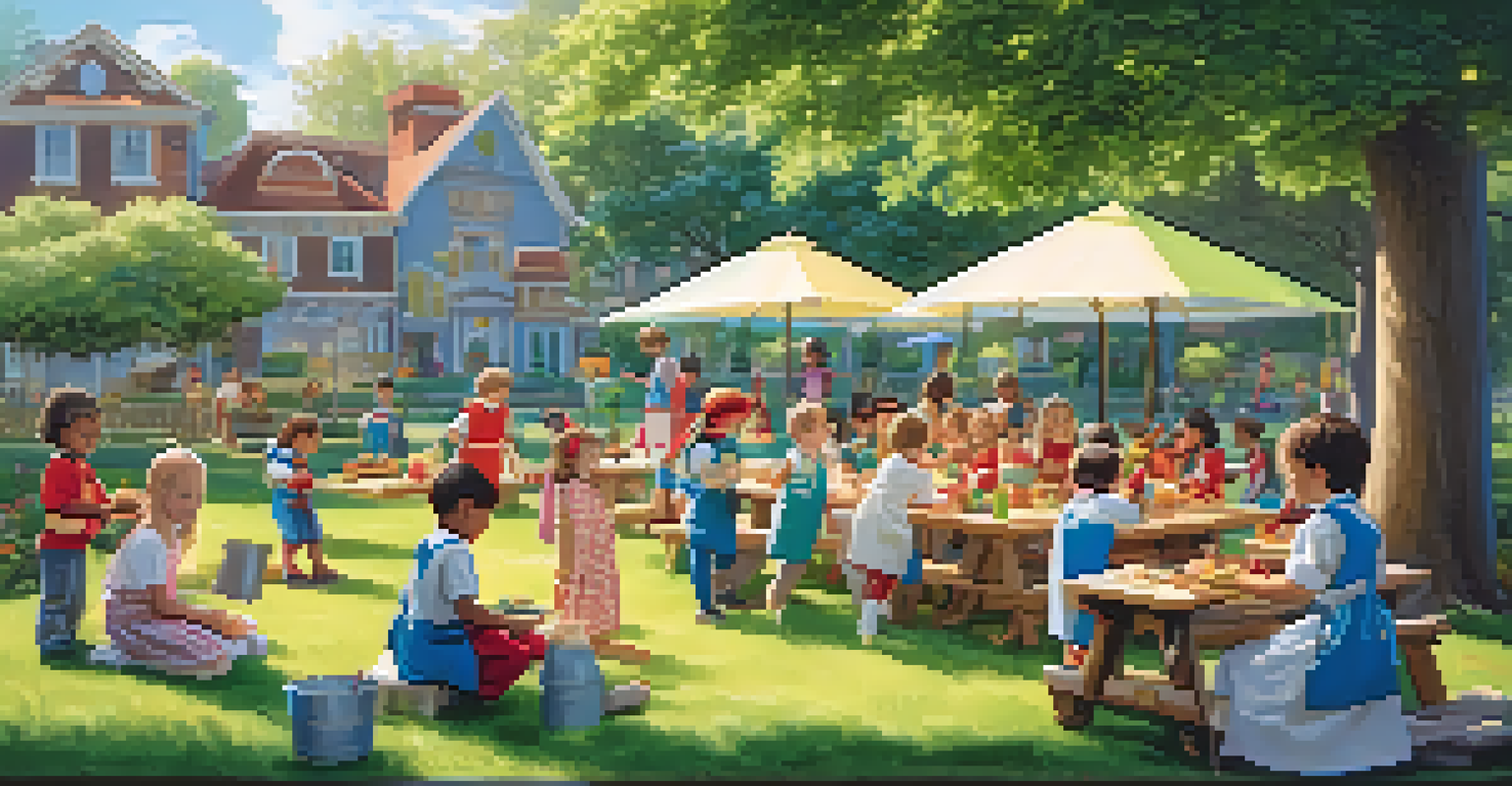The Role of Imagination in Learning Through Play

Understanding the Power of Imagination in Learning
Imagination is a powerful tool that shapes how we learn and understand the world. It allows learners to visualize concepts and ideas that may be abstract or complex. When children engage in imaginative play, they often create scenarios that help them grasp new information in a fun and engaging way.
Imagination is more important than knowledge. For knowledge is limited, whereas imagination embraces the entire world, stimulating progress, giving birth to evolution.
For instance, when kids pretend to be astronauts exploring space, they are not just having fun; they are also learning about space, physics, and teamwork. This imaginative play fosters creativity and critical thinking skills that are essential for problem-solving in real life.
Ultimately, imagination acts as a bridge between play and learning, making it an essential component of effective education. By encouraging imaginative play, educators and parents can help children develop a deeper understanding of various subjects.
Play as a Medium for Learning and Development
Play is often seen as just a way to pass the time, but it's a vital part of learning and development. Through play, children explore their environment, experiment with new ideas, and learn social skills. This natural curiosity leads to deeper learning experiences that are both meaningful and memorable.

For example, when kids build with blocks, they are not only having fun; they are also learning about balance, gravity, and spatial awareness. This hands-on approach to learning engages multiple senses, making the information stick in their minds longer.
Imagination Boosts Learning
Imaginative play enables children to visualize complex concepts, making learning both engaging and effective.
Moreover, play promotes emotional development by allowing children to express their feelings in a safe environment. This emotional intelligence is crucial for their overall growth and ability to work well with others as they navigate through life.
Imaginative Play Fosters Creativity and Innovation
Imaginative play is a breeding ground for creativity, allowing children to think outside the box. When they engage in make-believe scenarios, they often come up with novel solutions to problems, enhancing their innovative thinking. This kind of play not only nurtures creativity but also builds confidence in their abilities.
Play is the highest form of research.
Consider a group of children pretending to be chefs in a restaurant. They create menus, decide on dishes, and even role-play as customers. Through this experience, they learn about food, culture, and entrepreneurship while exercising their creative muscles.
Encouraging imaginative play helps children embrace creativity as a valuable skill. As they grow, these creative problem-solving abilities can translate into real-world applications, making them more adaptable and resourceful individuals.
Imagination Enhances Cognitive Skills in Children
Cognitive skills, such as memory, reasoning, and attention, are crucial for learning. Imaginative play plays a significant role in developing these skills by challenging children to think critically and make decisions. As they navigate through different scenarios, they learn to process information and draw conclusions.
For instance, when children engage in role-playing games, they must remember character traits, storylines, and rules. This not only boosts their memory but also enhances their ability to focus on tasks and follow instructions.
Play Enhances Social Skills
Through collaborative play, children develop essential social skills like communication, empathy, and teamwork.
Incorporating imaginative play into learning environments can significantly improve cognitive abilities. It creates a dynamic atmosphere where children can experiment, learn from mistakes, and develop a love for learning.
Social Skills Development through Imaginative Play
Imaginative play is an excellent avenue for children to develop essential social skills. Through collaborative play, they learn how to communicate, share, and empathize with others. These interactions help them build friendships and understand different perspectives.
For example, when children engage in a group game, they must negotiate roles and agree on rules. This process teaches them conflict resolution and teamwork, skills that are vital for success in both personal and professional relationships.
As they navigate social dynamics during play, children develop patience and cooperation. These experiences lay the foundation for strong interpersonal skills that will serve them well throughout their lives.
The Role of Educators in Encouraging Imaginative Play
Educators play a pivotal role in fostering an environment where imaginative play thrives. By creating opportunities for creative exploration, they can inspire children to engage in imaginative activities. This could include providing open-ended materials, such as art supplies or building blocks, that encourage creativity.
Additionally, teachers can incorporate play into their lesson plans, using storytelling or role-playing to make learning more engaging. By doing so, they help students connect with the material on a personal level, enhancing retention and understanding.
Educators Foster Imagination
Teachers can inspire imaginative play by incorporating creative exploration into their lesson plans, enhancing student engagement.
Ultimately, educators who prioritize imaginative play contribute significantly to their students' holistic development. By recognizing the value of play in learning, they pave the way for a more engaging and effective educational experience.
Parental Support in Imaginative Learning Through Play
Parents play a crucial role in nurturing their children's imagination and love for play. By actively participating in playtime, parents can model creativity and encourage their children to explore new ideas. This involvement also strengthens the parent-child bond and creates lasting memories.
For instance, parents can set aside dedicated time for imaginative play, such as building forts or playing dress-up. These simple activities not only foster creativity but also provide children with a sense of security and support in their explorations.

Moreover, parents can reinforce the skills learned during play by discussing the stories and scenarios created during these activities. This conversation helps children articulate their thoughts and enhances their understanding of the world around them.
Conclusion: The Lasting Impact of Imagination in Learning
In conclusion, imagination plays a critical role in learning through play, influencing cognitive, emotional, and social development. By engaging in imaginative play, children not only enjoy themselves but also acquire essential skills that will benefit them throughout their lives. This unique blend of learning and fun fosters a lifelong love for exploration and creativity.
As we recognize the importance of imagination in education, it's essential to encourage play at home, in schools, and within communities. By doing so, we create an environment where children can thrive and explore their potential.
Ultimately, embracing the role of imagination in learning through play can lead to a brighter future for our children. It equips them with the tools they need to navigate an ever-changing world while remaining curious and innovative.